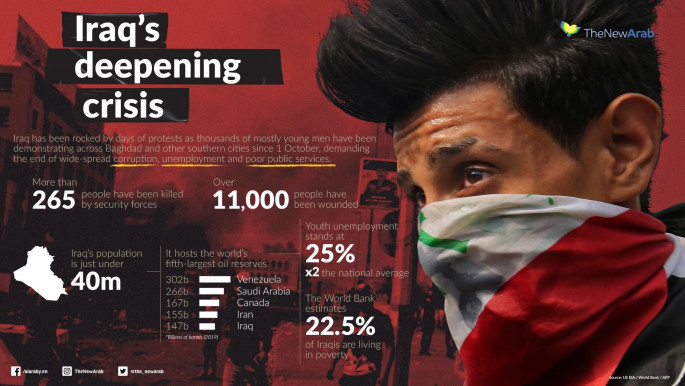
The new patriotism in Lebanon and Iraq
Protesters have emphasised inclusive messages and eschewed the promotion of narrow and sect-based interests that have characterised the vertical cleavages in their societies, such as religion, confession, geography and tribe.
For weeks, demonstrators of all religious and sectarian persuasions in both countries have declared their rejection of politics as usual. What unifies them, is their insistence on being treated as respected and dignified citizens in respectable states.
Lebanese and Iraqi protesters want radical reform that helps to create a new public and political space in which all have the same freedom under the law, and all bear equitable responsibility.
To be sure, what we are witnessing today in Lebanon and Iraq is the rise of a new patriotism in two of the Arab world's most pluralistic societies. The success of this drive is likely going to impact other Arab countries and the future of the Arab political order.
The sweep of Lebanon's protests
Until last October, Lebanon's protests had been limited, weak, and mostly ineffective; and some saw violence directed at public assets. The vertical cleavages in society - specifically sectarianism and factional politics - prevented the coalescence of equally-discontented communities to force necessary change.
Today, that divisiveness has been dismanteled across many sectors of society, with people uniting instead around deeply felt grievances: the dire state of public services, government graft and malfeasance, and a lack of confidence in a corrupt political class. The remedy is seen as a complete deconstruction, not only of said class, but also of the system that helped to nourish it.
 |
We are witnessing today in Lebanon and Iraq is the rise of a new patriotism in two of the Arab world's most pluralistic societies |  |
Demonstrators are also rejecting the extra-legal status of Hezbollah, Iran's implant inside Lebanon's body politic. Nothing happens in the country without Hezbollah agreeing to it, and always with a thought for how decisions will reflect on its Iranian patrons.
What is interesting, and striking about the makeup of the protesters is their inclusivity: Non- and cross-sectarian, urban and rural, male and female, old and young, educated and semi-literate, rich and poor, and everyone in between.
Most interesting, however, is the unified demand for the establishment of a dignified, independent nation for a dignified people, run according to the principles of equality, capability, experience, and devotion to the public good. People in the streets want better living conditions and governance, but only in a nation of which they all are proud.
The desire for change in Lebanon has been unleashed and it cannot be restricted to the confines of confessional politics. Any attempt to ignore it by the powers that be, will pose a great risk to civic peace and political and economic stability for a long time to come.
Iraq's awakening
Following the American-led invasion of Iraq in 2003, Lebanon's power sharing system was touted as a successful example for a diverse society coming out of war and decades of repression and authoritarian rule.
Institutionally, Iraqi power centers and their associated authority were allocated seemingly equitably. Care was taken to find room for all political forces that survived the post-invasion purges.
Iraq's Shias and Kurds, who suffered immeasurably under the vanquished regime, arguably came out the biggest winners, while the Sunnis found themselves having to fight for the leftovers.
But the geography of the protests clearly shows that only those Shias who have connections with powerful political groups have really benefited from the system.
 |
Dignity can only be assured in a nation that defends its citizens without looking at their sectarian affiliation |  |
Over the last 16 years of institutionalised confessional politics, Iraq has fallen victim to the same evils besetting Lebanon's political arrangement. Those on the inside found great opportunities to plunder and accumulate power, while those on the outside fought to be allowed a piece of the pie.
Today, Iraqis of all walks of life have awakened to the injustices of the confessional arrangement, and are demanding radical changes to it. They, too, are decrying the failure of state institutions, government graft and corruption, multi-layered illegal practices, and the power of independent sectarian militias.
They also are protesting the undue influence of Iran as a neighbouring power with deep rooted support among the same Shia sectarian leaders the protesters abhor. To the demonstrators, corruption has transcended its moral and ethical boundaries and become entwined with the humiliation of outside interference.
Those in the streets of Baghdad and Iraq's southern cities have realised that the spoils accruing from the sectarian system are not enough - or are too unfairly distributed - to preserve their dignity and respect. They have realised that said dignity can only be assured in a nation that defends its citizens without looking at their sectarian affiliation and identity.
 |
|
Bright spots for a different Arab world
Lebanese and Iraqi demonstrators today are picking up the banner of a dignified national identity that has been submerged under the guises of power sharing and confessional formulas. Even if the two states' security apparatuses were able to force everyone off the street, a new chapter in the two countries' histories has been opened; and more will follow.
Perhaps the best hope for a move away from sectarianism is that the unaffiliated youth are taking the lead. The political forces ruling the two countries have realised that the time for change has finally arrived.
We can also hope that forces maintaining the status quo in other Arab countries come to realise that the waves of protests taking place on their streets - in Egypt, Sudan, and Algeria - are also forms of a rising patriotism. They would do well to welcome it.
Imad K. Harb is the Director of Research and Analysis at Arab Center Washington DC.
Join the conversation: @The_NewArab
Opinions expressed in this article remain those of the author and do not necessarily represent those of The New Arab.




